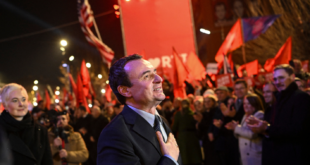The EU mission in Kosovo, EULEX, today said that it “firmly believes that progress in the north of Kosovo can be made only by dialogue”.
A statement from the mission’s press service further said that this could be achieved by involving all communities concerned, “and step by step”.
The statement added that EULEX had “repeatedly stated that the ‘Strategy for the north’ is neither an EU strategy or a EULEX paper. It is a document drafted by the International Civilian Office (ICO).”
EULEX also said that its staff did not visit the northern parts of Kosovo tasked with supporting the implementation of the ICO plan.
EULEX spokeswoman Karin Limdal said a part of the mission staff “would be moving into northern Kosovo soon with the task of supporting the implementation of the plan of the ICO chief Pieter Feith”, since the situation in that part of the province was “complex due to the existence of parallel institutions”.
Limdal stated that EU officials who had visited the north “had the task of advocating the implementation of the ICO plan”.
In its reaction today, EULEX referred to the quotes attributed to Limdal as “false and completely inaccurate”, adding that the mission never held the position attributed to its spokeswoman, said Tanjug.
The strategy that was created by Feith and the temporary institutions in Priština envisages support of the international community and direct linking of Serbia’s EU aspirations and a reduction of Belgrade’s support for the “parallel structures” in the north.
The strategy was created by Feith and the temporary institutions in Priština, and it is part of the decentralization process in Kosovo, with the goal of taking over control in the northern part of Kosovska Mitrovica.
On Friday, the Italian Ambassador Michael Giffoni, whom the EU named the “coordinator“ for northern Kosovo in October of last year, said that the “situation in the north is constantly changing and much more complex than the situation south of the Ibar.“
He said that “a mature approach must be adopted with a concentration on the possibility of dialogue between the communities, dealing with concrete questions and issues essential to the people.“
“We need to find common points and stop creating myths over the status of Kosovo,” he said, adding that he has “received encouraging signals from the local Serb community,”.
 Eurasia Press & News
Eurasia Press & News



